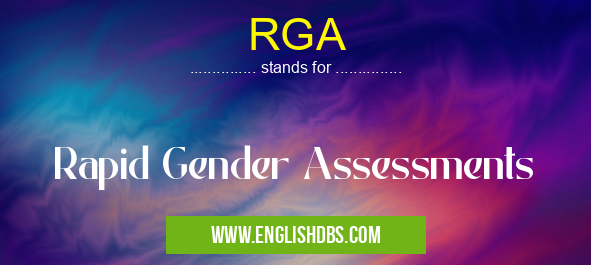What does RGA mean in UNCLASSIFIED
RGA stands for Rapid Gender Assessments. It is a tool used to quickly gather information about gender roles, relations, and inequalities in a specific context. RGAs are typically conducted in emergency or post-crisis settings, where there is a need for rapid information to inform programming and decision-making.

RGA meaning in Unclassified in Miscellaneous
RGA mostly used in an acronym Unclassified in Category Miscellaneous that means Rapid Gender Assessments
Shorthand: RGA,
Full Form: Rapid Gender Assessments
For more information of "Rapid Gender Assessments", see the section below.
Key Features of RGAs
- Rapid: RGAs are designed to be conducted in a short period of time, often within a few days or weeks.
- Gender-focused: They focus specifically on gender dynamics and inequalities, including power relations, access to resources, and decision-making.
- Participatory: RGAs involve participation from a wide range of stakeholders, including women, men, boys, girls, and representatives from different groups and organizations.
- Context-specific: RGAs are tailored to the specific context in which they are conducted, taking into account cultural norms, social structures, and the prevailing gender inequalities.
Methods of Conducting RGAs
RGAs can be conducted using a variety of methods, including:
- Key informant interviews: Interviews with individuals who have knowledge and expertise on gender issues in the community.
- Focus group discussions: Group discussions with participants from different backgrounds and perspectives.
- Participatory observation: Direct observation of gender dynamics and inequalities in everyday life.
- Document review: Analysis of existing documents and reports on gender issues.
Uses of RGAs
RGAs are used for a variety of purposes, including:
- Program design: Informing the development of gender-sensitive programs and interventions.
- Policy development: Assisting in the formulation of gender-responsive policies and strategies.
- Advocacy: Providing evidence for advocacy efforts on gender equality and women's rights.
- Monitoring and evaluation: Tracking progress and evaluating the impact of gender-related programs and policies.
Essential Questions and Answers on Rapid Gender Assessments in "MISCELLANEOUS»UNFILED"
What are Rapid Gender Assessments (RGAs)?
Rapid Gender Assessments (RGAs) are assessments that use qualitative and quantitative data to rapidly gather information on gender roles, responsibilities, opportunities, and constraints in a given context. The goal of RGAs is to inform humanitarian and development interventions by providing a deeper understanding of gender dynamics and how they impact different groups of people.
What are the key elements of RGAs?
RGAs typically include the following elements:
- Gender analysis: This involves examining gender roles, responsibilities, opportunities, and constraints within a specific context.
- Data collection: RGAs collect data through a variety of methods, such as surveys, focus groups, and interviews.
- Data analysis: The collected data is analyzed to identify key gender issues and trends.
- Development of recommendations: The findings of the RGA are used to develop recommendations for humanitarian and development interventions that are gender-responsive and equitable.
How are RGAs conducted?
RGAs are typically conducted by a team of researchers with expertise in gender analysis and data collection. The team works closely with local partners and stakeholders to ensure that the assessment is relevant and culturally appropriate.
What are the benefits of conducting RGAs?
RGAs provide a number of benefits, including:
- Improved understanding of gender dynamics in a given context
- Identification of key gender issues and trends
- Development of gender-responsive and equitable humanitarian and development interventions
- Increased accountability for gender equality and women's empowerment
When should RGAs be conducted?
RGAs can be conducted at any stage of the humanitarian or development cycle, but they are particularly useful during the emergency response phase and the early stages of recovery. This allows for the timely integration of gender considerations into interventions.
Final Words: RGAs are a valuable tool for quickly gathering information on gender dynamics and inequalities in emergency and post-crisis settings. By providing timely and context-specific data, RGAs help inform programming, decision-making, and advocacy efforts aimed at promoting gender equality and women's empowerment.
RGA also stands for: |
|
| All stands for RGA |
